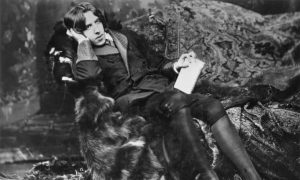Anthony Quinn in The Guardian:
 Physically unprepossessing – overgrown, clumsy, “slab-faced” – he was nonetheless a magnetic presence, and in his fledgling days in London as high priest of the aesthetic movement he endured chaffing with “remarkable nonchalance”. One gets here the sense of the young Wilde’s talent to annoy as much as to amuse. James Whistler, from whom he learned the art of self-advertisement, eventually turned on him (he had taught his protege too well). To Dante Gabriel Rossetti and Algernon Swinburne, his other heroes, he was an upstart and a “nobody”. On his year-long lecture tour of the US he didn’t always meet with acclaim, or even a civil welcome – a woman in Washington advised him to “wear your hair shorter and your trousers longer”. Back in London he made an advantageous marriage to Constance Lloyd, an heiress, sired two boys and gravitated to the centre of society’s “swirl and whirl”, borne on his gift for talk and his burgeoning talent as a playwright. Arguably the turning points of his life were twofold: his meeting in 1886 with Robbie Ross, who initiated him in homosexual desire and the dangerous enchantments of a double life, and his later introduction to Alfred Douglas, AKA Bosie, whose vicious feud with his father, the 9th Marquess of Queensberry, became the millstones between which Wilde was helplessly ground to dust.
Physically unprepossessing – overgrown, clumsy, “slab-faced” – he was nonetheless a magnetic presence, and in his fledgling days in London as high priest of the aesthetic movement he endured chaffing with “remarkable nonchalance”. One gets here the sense of the young Wilde’s talent to annoy as much as to amuse. James Whistler, from whom he learned the art of self-advertisement, eventually turned on him (he had taught his protege too well). To Dante Gabriel Rossetti and Algernon Swinburne, his other heroes, he was an upstart and a “nobody”. On his year-long lecture tour of the US he didn’t always meet with acclaim, or even a civil welcome – a woman in Washington advised him to “wear your hair shorter and your trousers longer”. Back in London he made an advantageous marriage to Constance Lloyd, an heiress, sired two boys and gravitated to the centre of society’s “swirl and whirl”, borne on his gift for talk and his burgeoning talent as a playwright. Arguably the turning points of his life were twofold: his meeting in 1886 with Robbie Ross, who initiated him in homosexual desire and the dangerous enchantments of a double life, and his later introduction to Alfred Douglas, AKA Bosie, whose vicious feud with his father, the 9th Marquess of Queensberry, became the millstones between which Wilde was helplessly ground to dust.
The story of his fall continues to hold and haunt, enclosing as it does a double mystery. The first is his devotion to Douglas, whose cruelty, recklessness and near-insane bouts of rage threatened to alienate Wilde for good yet never did. Can it be explained? Cyril Connolly thought it was exactly Bosie’s failings – “this invulnerable rival egotism” – that kept Wilde on the hook. He may be right. The second is the enigma of Wilde’s refusal to flee once Queensberry and his hired detectives had him cold and a conviction surely beckoned. “Everyone wants me to go abroad,” said Wilde, seeing no use, “unless one is a missionary…or a commercial traveller”. Sturgis thinks there was a strain of defiance in his staying put, though “inertia” probably contributed, too. He may have been resigned to his fate and become “almost an observer of his own catastrophe”.
More here.
